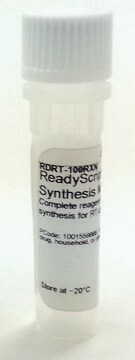10109118001
Roche
Reverse Transcriptase AMV
solution, >50 units/μg protein, suitable for RT-qPCR, suitable for RT-PCR
Synonyme(s) :
amv reverse transcriptase
About This Item
Produits recommandés
Forme
solution
Niveau de qualité
Activité spécifique
>50 units/μg protein
Caractéristiques
dNTPs included: no
hotstart: no
Conditionnement
pkg of 1,000 U
Fabricant/nom de marque
Roche
Conditions de stockage
avoid repeated freeze/thaw cycles
Paramètres
42 °C optimum reaction temp.
Technique(s)
RT-PCR: suitable
RT-qPCR: suitable
Entrée
purified RNA
Méthode de détection
probe-based
Description générale
The enzyme can also be used for RNA sequencing, 3′ end labeling of DNA fragments, and the generation of ss probes for genomic footprints.
Reverse Transcriptase AMV requires a primer and Mg2+ or Mn2+ for activity.
Spécificité
Heat inactivation: 5 min, 95 °C
Application
- First- and second-strand cDNA synthesis and synthesis of first strand cDNA for use in subsequent amplification reactions (RT-PCR)
- Dideoxy DNA sequencing
- Primer extension
- RNA sequencing
- 3′-end labeling of DNA fragments
- Generation of single-stranded probes for genomic footprint experiments
Caractéristiques et avantages
- Efficiently transcribes total RNA, mRNA, viral RNA and RNA rich in secondary structures
- Procure full length cDNA fragments up to 12 kb
- Higher thermostability (up to 60°C) and specificity than M-MuLV Reverse Transcriptase
Conditionnement
Qualité
Function test: Reverse Transcriptase AMV is function tested in the cDNA Synthesis Kit and RT-PCR.
Définition de l'unité
Volume Activity: 20-25 U/μl. Please refer to the Certificate of Analysis for more information.
Notes préparatoires
Stockage et stabilité
Autres remarques
Composants de kit seuls
- Reverse Transcriptase AMV 20-25 U/μl
- First-strand cDNA Synthesis Buffer 5x concentrated
Code de la classe de stockage
12 - Non Combustible Liquids
Classe de danger pour l'eau (WGK)
WGK 1
Point d'éclair (°F)
does not flash
Point d'éclair (°C)
does not flash
Certificats d'analyse (COA)
Recherchez un Certificats d'analyse (COA) en saisissant le numéro de lot du produit. Les numéros de lot figurent sur l'étiquette du produit après les mots "Lot" ou "Batch".
Déjà en possession de ce produit ?
Retrouvez la documentation relative aux produits que vous avez récemment achetés dans la Bibliothèque de documents.
Les clients ont également consulté
Contenu apparenté
RT-qPCR, or quantitative reverse transcription PCR, combines the effects of reverse transcription and quantitative PCR or real-time PCR to amplify and detect specific targets. RT-qPCR has a variety of applications including quantifying gene expression levels, validating RNA interference (RNAi), and detecting pathogens such as viruses.
Notre équipe de scientifiques dispose d'une expérience dans tous les secteurs de la recherche, notamment en sciences de la vie, science des matériaux, synthèse chimique, chromatographie, analyse et dans de nombreux autres domaines..
Contacter notre Service technique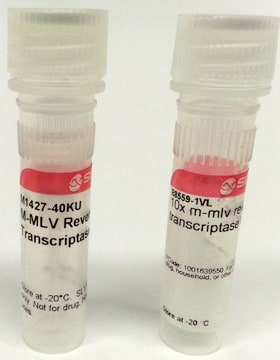

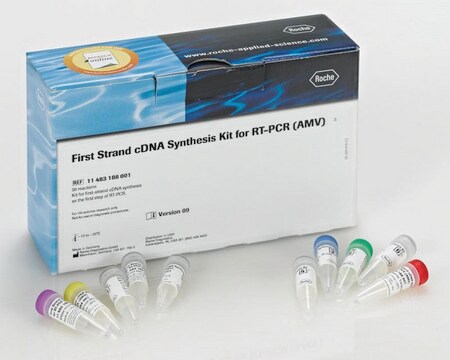

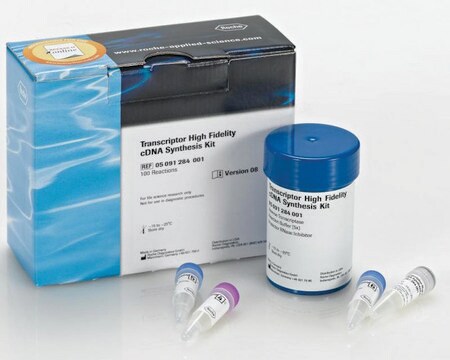
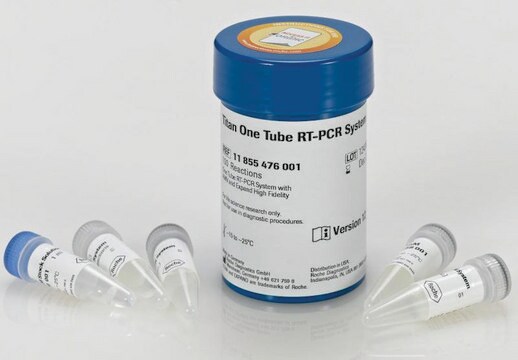
![Enhanced Avian Reverse Transcriptase [eAMV™ RT] For reverse transcription at higher temperatures & rare mRNAs](/deepweb/assets/sigmaaldrich/product/images/496/245/af9bcef6-1474-494b-8fba-32ca0fd56c42/640/af9bcef6-1474-494b-8fba-32ca0fd56c42.jpg)

